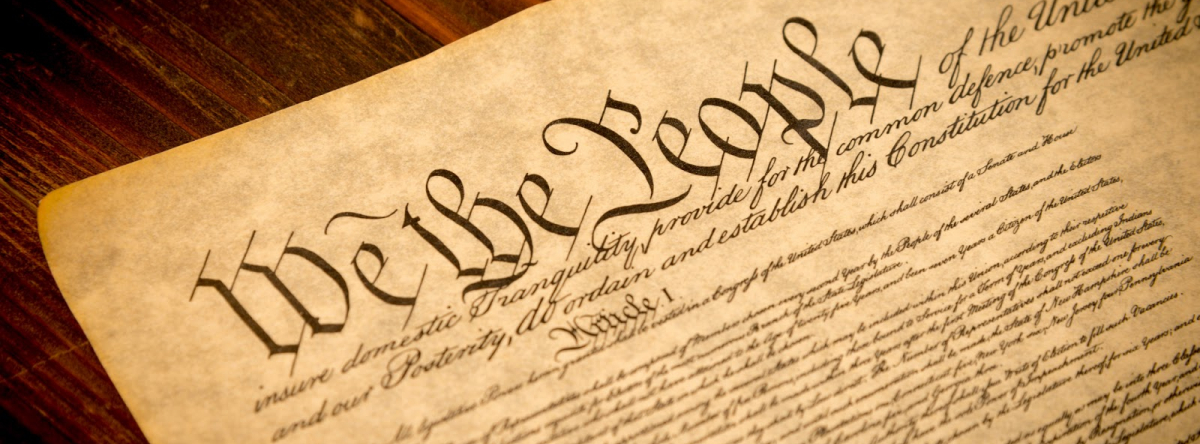H.R. 1: For the People Act of 2021
Jan 26, 2021 Law Enforcement Today by Pat Droney
WASHINGTON, DC- Are you familiar with H.R.1: For the People Act of 2021? If you’re not you should be. The act would be better named “H.R.1: For Making Sure Republicans Never Win Another National Election Act of 2021.”
This bill, if passed will fundamentally change how America conducts elections. Actually what it will do in part is codify the apparent massive irregularities that occurred in the 2020 election.
Before getting into the sordid details of this abomination, let’s take a look at Article II, Section I, Clause II of the United States Constitution:
Each State shall appoint, in such Manner as the Legislature thereof may direct, a Number of Electors, equal to the whole Number of Senators and Representatives to which the State may be entitled in the Congress…
In other words, the Framers of the Constitution specifically said that state legislatures, not Congress shall determine how electors are determined in their states.
This argument was part of the irregularities argued in the 2020 election, as several states, among them Georgia, Pennsylvania, Wisconsin and Michigan all had election laws changed either by courts, governors or unelected election officials.
It would appear that what Congress is trying to do, in part would be unconstitutional, although truth be told, it is uncertain if the Supreme Court, which has shown itself to be pretty much gutless with a few exceptions would do their Constitutional duty. However, here is what is proposed in H.R., proposed by Rep. John P. Sarbanes (D-MD). This is not the full text of the bill, just the “highlights”:
1). Internet-only registration with electronic signature submission.
(a) Requiring Availability For Online Registration- Each State, acting through the chief State election official shall ensure that the following services are available to the public at any time on the official public websites of the appropriate State and local election officials in the State, in the same manner and subject to the same terms and conditions as the services provided by voter registration agencies under section 7(a);
(1) Online application for voter registration
2). Banning the requirement to provide a full SSN for voter registration
Sec 1005. PROHIBITING STATE FROM REQUIRING APPLICANTS TO PROVIDE MORE THAN LAST 4 DIGITS OF SOCIAL SECURITY NUMBER
(a) Form Included With Application For Motor Vehicle Driver’s License- Section 5 (c)(2)(B)(ii) of the National Voter Registration Act of 1993 (52 U.S.C. 20504(c)(2)(B)(ii) is amended by striking the semicolon at the end and inserting the following: “and to the extent that the application requires the applicant to provide a Social Security number, may not require the applicant to provide more than the last 4 digits of such number;”.
3) Nationwide “Motor Voter” registration
(2) DEFINITION.—The term “automatic registration” means a system that registers an individual to vote in elections for Federal office in a State, if eligible, by electronically transferring the information necessary for registration from government agencies to election officials of the State so that, unless the individual affirmatively declines to be registered, the individual will be registered to vote in such elections.
NOTE: In other words, motor voter, which provides registration for anyone either obtaining or renewing an operator’s license or registration, would be mandatory. This type of program is alleged to be the reason that thousands of illegals became registered voters in states such as California and Nevada.
4) 16 year olds required to be registered to vote
(d) Treatment of Individuals Under 18 Years of Age—A state may not refuse to treat an individual as an eligible individual for purposes of this part on the grounds that the individual is less than 18 years of age at the time a contributing agency receives information with respect to the individual, so long as the individual is at least 16 years of age at such time. Nothing in the previous sentence may be construed to require a State to permit an individual who is under 18 years of age at the time of an election for Federal office to vote in the election.
5) Nationwide same-day registration
(1) REGISTRATION.—Each State shall permit an eligible individual on the day of a Federal election and on any day when voting, including early voting is permitted for a Federal election—
(A) to register to vote in such election at the polling place using a form that meets the requirements under section 9(b) of the National Voter Registration Act of 1993 (or, if the individual is already registered to vote, to revise any of the individual’s voter registration information); and
(B) to cast a vote in such election
6) Grants (25M for using minors in election activities.
(1) IN GENERAL- The Election Assistance Commission (hereafter in this section referred to as the “Commission”) shall make grants to eligible States to enable such States to carry out a plan to increase the involvement of individuals under 18 years of age in public election activities in the State.
7) More children voters.
(k) Acceptance of Applications From Individuals Under 18 Years of Age-
(1) IN GENERAL- A State may not refuse to accept or process an individuals application to register to vote in elections for Federal office on the grounds that the individual is under 18 years of age at the time the individual submits the application, so long as the individual is at least 16 years of age at such time.
8) Prohibiting attempts to clean voter rolls of non-residents.
(1) REQUIREMENTS FOR CHALLENGES—No person, other than a State or local election official, shall submit a formal challenge to an individual’s eligibility to register to vote in an election for Federal office or to vote in an election for Federal office unless that challenge is supported by personal knowledge regarding the grounds for ineligibility which is—
9) Would permit convicted felons the right to vote
(1) NOTIFICATION—On the date determined under paragraph (2), each State shall notify in writing any individual who has been convicted of a criminal offense under the law of that State that such individual has the right to vote in an election for Federal office pursuant to the Democracy Restoration Act of 2021 and may register to vote in any such election and provide such individual with any materials that are necessary to register to vote in any such election.
Do you want to join our private family of first responders and supporters? Get unprecedented access to some of the most powerful stories that the media refuses to show you. Proceeds get reinvested into having active, retired and wounded officers, their families and supporters tell more of these stories. Click to check it out.
10) Mandatory early voting
(1) IN GENERAL—Each State shall allow individuals to vote in an election for Federal office during an early voting period which occurs prior to the date of the election, in the same manner as voting is allowed on such date.
11) Nationwide vote by mail, ban on ballot protection measures, legalized limitless ballot harvesting
Sec. 307. PROMOTING ABILITY OF VOTERS TO VOTE BY MAIL
(a) Uniform Availability of Absentee Voting to All Voters—
(1) IN GENERAL- If an individual in a State is eligible to cast a vote in an election for Federal office, the State may not impose any additional conditions or requirements on the eligibility of the individual to cast the vote in such election by absentee ballot by mail.
(2) ADMINISTRATION OF VOTING BY MAIL—
(A) PROHIBITING IDENTIFICATION REQUIREMENT AS CONDITION OF OBTAINING BALLOT—A State may not require an individual to provide any form of identification as a condition of obtaining an absentee ballot, except that nothing in this paragraph may be construed to prevent a State from requiring a signature of the individual or similar affirmation as a condition of obtaining an absentee ballot.
(B) PROHIBITING REQUIREMENT TO PROVIDE NOTARIZATION OR WITNESS SIGNATURE AS CONDITION OF OBTAINING OR CASTING BALLOT.—A state may not require notarization or witness signature or other formal authentication (other than voter attestation) as a condition of obtaining or casting an absentee ballot.
(3) PERMITTING VOTERS TO DESIGNATE OTHER PERSON TO RETURN BALLOT
(A) Shall permit a voter to designate any person to return a voted and sealed absentee ballot to the post office, a ballot drop-off location, tribally designated building, or election office so long as the person designated to return the ballot does not receive any form of compensation based on the number of ballots that the person has returned and no individual, group, or organization provides compensation on this basis; and
(B) May not put any limit on how many voted and sealed absentee ballots any designated person can return to the post office, a ballot drop off location, tribally designated building, or election office.
12) Banning Voter ID
(1) IN GENERAL.—Except as provided in subsection (C), if a State has in effect a requirement that an individual present identification as a condition of receiving and casting a ballot in an election for Federal office, the State shall permit the individual to meet the requirement—
(A) in the case of an individual who desires to vote in person, by presenting the appropriate State or local election official with a sworn written statement, signed by the individual under penalty of perjury, is attesting to the individual’s identity and attesting that the individual is eligible to vote in the election;
Other provisions in the legislative proposal? It would explore statehood for the District of Columbia (clearly unconstitutional), would look into extending voting rights to United States territories such as Puerto Rico and Guam, would establish complete Congressional takeover of redistricting.
Probably one of the most damning and frankly tyrannical proposal is found in Sec. 3201 of the Bill, NATIONAL STRATEGY TO PROTECT UNITED STATES DEMOCRATIC INSTITUTIONS.
Sounds noble, right? However as always happens with Congressional bills, the devil is in the details. Here they are:
(a) In General—Not later than one year after the date of the enactment of this Act, the President, acting through the Secretary, in consultation with the Chairman, the Secretary of Defense, the Secretary of State, the Attorney General, the Secretary of Education, the Director of National Intelligence, the Chairman of the Federal Election Commission, and the heads of any other appropriate Federal agencies, shall issue a national strategy to protect any cyber-attacks, influence operations, disinformation campaigns [emphasis added], and other activities that could undermine the security and integrity of the United States democratic institutions.
(b) Considerations—the national strategy required under subsection (a) shall include consideration of the following:
(1) The threat of a foreign state actor, foreign terrorist organization (ad designated pursuant to section 219 of the Immigration and Nationality Act (8 U.S.C. 1189)), or a domestic actor carrying out a cyber-attack, influence operation, disinformation campaign, or other activity aimed at undermining the security and integrity of United States democratic institutions.
(3) Potential consequences, such as an erosion of public trust or an undermining of the rule of law, that could result from a successful cyber-attack, influence operation, disinformation campaign, or other activity aimed at undermining the security and integrity of United States democratic institutions.
Read that last section carefully. What Sec. 3201 would do is effectively criminalize ANY allegation of possible election fraud. This undermines the right to free speech under the First Amendment.
Looking at this bill in its entirety, what Democrats are looking to do is codify election fraud. If this law passes, Democrats will have a stranglehold on national elections going forward. Please share this with as many people as possible.
About The Author
Pat Droney is a retired police officer, having worked in the field in for over 31 years, up to and including the rank of Chief of Police. After retirement, Pat worked as Director of Campus Safety for a private school, as well as Loss Prevention Supervisor in the retail sector. He currently is a supervisor for a large passenger airline. Pat is a proud Reagan conservative patriot, loves his Irish heritage, but especially loves his country and is an unabashed supporter of our military.
Share This Post...











